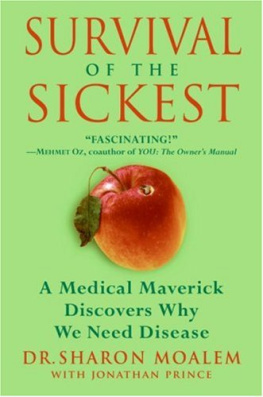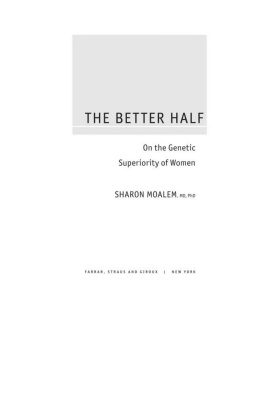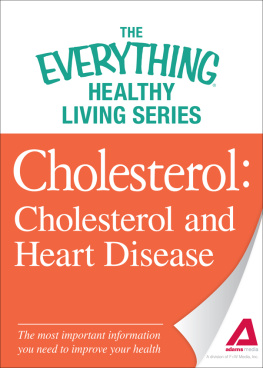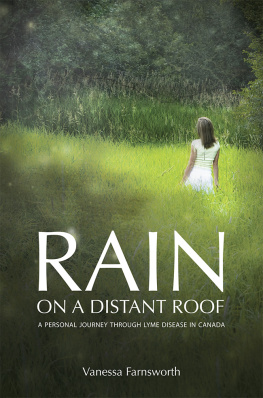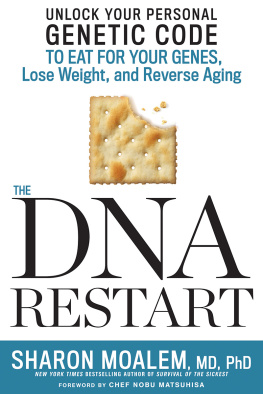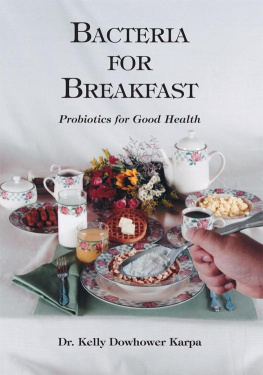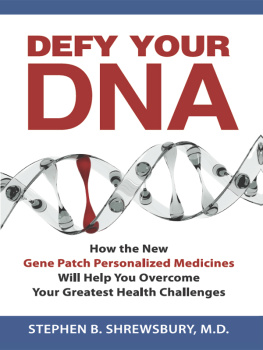DR. SHARON MOALEM
with Jonathan Prince
To my grandparents
Tibi and Josephina Elizabeth Weiss,
whose lives served to teach me
the complexities of survival
CONTENTS
Introduction
CHAPTER I
Ironing It Out
CHAPTER II
A Spoonful of Sugar Helps the Temperature Go Down
CHAPTER III
The Cholesterol Also Rises
CHAPTER IV
Hey, Bud, Can You Do Me a Fava?
CHAPTER V
Of Microbes and Men
CHAPTER VI
Jump into the Gene Pool
CHAPTER VII
Methyl Madness: Road to the Final Phenotype
CHAPTER VIII
Thats Life: Why You and Your iPod Must Die
Conclusion
Acknowledgments
Notes
Searchable Terms
About the Authors
Cover
Copyright
About the Publisher
INTRODUCTION
T his is a book about mysteries and miracles. About medicine and myth. About cold iron, red blood, and neverending ice. Its a book about survival and creation. Its a book that wonders why, and a book that asks why not. Its a book in love with order and a book that craves a little chaos.
Most of all, its a book about lifeyours, ours, and that of every little living thing under the sun. About how we all got here, where were all going, and what we can do about it.
Welcome to our magical medical mystery tour.
WHEN I WAS fifteen years old, my grandfather was diagnosed with Alzheimers disease. He was seventy-one. Alzheimersas too many people knowis a terrible disease to watch. And when youre fifteen, watching a strong, loving man drift away almost before your eyes, its hard to accept. You want answers. You want to know why.
Now, there was one thing about my grandfather that always struck me as kind of strangehe loved to give blood. And I mean he loved it. He loved the way it made him feel; he loved the way it energized him. Most people donate blood purely because it makes them feel good emotionally to do something altruisticnot my grandfather; it made him feel good both emotionally and physically. He said no matter where his body hurt, all he needed was a good bleeding to make the aches and pains go away. I couldnt understand how giving away a pint of the stuff our lives depend on could make someone feel so good. I asked my high school biology teachers. I asked the family doctor. Nobody could explain it. So I felt it was up to me to figure it out.
I convinced my father to take me to a medical library, where I spent countless hours searching for an answer. I dont know how I possibly found it among the thousands and thousands of books in the library, but something steered me there. In a hunch, I decided to plow through all the books about ironI knew enough to know that iron was one of the big things my grandfather was giving up every time he donated blood. And thenbam! There it wasa relatively unheard of hereditary condition called hemochromatosis. Basically, hemochromatosis is a disorder that causes iron to build up in the body. Eventually, the iron can build up to dangerous levels, where it damages organs like the pancreas and the liver; thats why its also called iron overload. Sometimes, some of that excess iron is deposited in the skin, giving you a George Hamilton perma-tan all year long. And as well explore, giving blood is the best way to reduce the iron levels in your bodyall my grandfathers blood donations were actually treating his hemochromatosis!
Well, when my grandfather was diagnosed with Alzheimers, I had a gut instinct that the two diseases had to be connected. After all, if hemochromatosis caused dangerous iron buildups that damaged other organs, why couldnt it contribute to damage in the brain? Of course, nobody took me very seriouslyI was fifteen.
When I went to college a few years later, there was no question that I was going to study biology. And there was no question that I was going to keep on searching for the link between Alzheimers and hemochromatosis. Soon after I graduated, I learned that the gene for hemochromatosis had been pinpointed; I knew that this was the right time to pursue my hunch seriously. I delayed medical school to enter a Ph.D. program focused on neurogenetics. After just two years of collaborative work with researchers and physicians from many different laboratories we had our answer. It was a complex genetic association, but sure enough there was indeed a link between hemochromatosis and certain types of Alzheimers disease.
It was a bittersweet victory, though. I had proved my high school hunch (and even earned a Ph.D. for it), but it did nothing for my grandfather. He had died twelve years earlier, at seventy-six, after five long years battling Alzheimers. Of course, I also knew that this discovery could help many othersand thats why I wanted to be a physician and a scientist in the first place.
And actually, as well discuss more in the next chapter, unlike many scientific discoveries, this one came with the potential for an immediate payoff. Hemochromatosis is one of the most common genetic disorders in people descended from Western Europeans: more than 30 percent carry these genes. And if you know you have hemochromatosis, there are some very straightforward steps you can take to reduce the iron levels in your blood and prevent the iron buildups that can damage your organs, including the one my grandfather discovered on his ownbleeding. And as for knowing whether or not you have hemochromatosiswell, there are a couple of very simple blood tests used to make the diagnosis. Thats about it. And if the results come back positive, then you start to give blood regularly and modify your diet. But you can live with it.
I do.
I WAS AROUND eighteen when I first started feeling achy. And then it dawned on memaybe I have iron overload like my grandfather. And sure enough, the tests came back positive. As you can imagine, that got me thinkingwhat did this mean for me? Why did I get it? And the biggest question of allwhy would so many people inherit a gene for something potentially so harmful? Why would evolutionwhich is supposed to weed out harmful traits and promote helpful onesallow this gene to persist?
Thats what this book is about.
The more I plunged into research, the more questions I wanted answered. This book is the product of all the questions I asked, the research they led to, and some of the connections uncovered along the way. I hope it gives you a window into the beautiful, varied, and interconnected nature of life on this wonderful world we inhabit.
Instead of just asking whats wrong and what can be done about it, I want people to look behind the evolutionary curtain, to ask why this condition or that particular infection occurs in the first place. I think the answers will surprise you, enlighten you, andin the long rungive all of us a chance to live longer, healthier lives.
Were going to start by looking at some hereditary disorders. Hereditary disorders are very interesting to people like me who study both evolution and medicinebecause common conditions that are only caused by inheritance should die out along the evolutionary line under most circumstances.
Evolution likes genetic traits that help us survive and reproduceit doesnt like traits that weaken us or threaten our health (especially when they threaten it before we can reproduce). That preference for genes that give us a survival or reproductive advantage is called natural selection. Here are the basics: If a gene produces a trait that makes an organism less likely to survive and reproduce, that gene (and thus, that trait) wont get passed on, at least not for very long, because the individuals who carry it are less likely to survive. On the other hand, when a gene produces a trait that makes an organism better suited for the environment and more likely to reproduce, that gene (and again, that trait) is more likely to get passed on to its offspring. The more advantageous a trait is, the faster the gene that produces it will spread through the gene pool.

